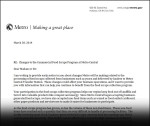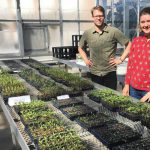BioCycle May 2014
Why Food Only In Portland, Oregon?
 The short answer: Excessive contamination in the collected organics from the commercial food scraps composting program combined with challenges caused by nonfood items at one of Metro’s selected processing facilities. (Metro is a regional governing body.) As of November 1, 2014, Metro’s facilities will no longer accept regular or waxed cardboard as part of its commercial composting program. As of March 1, 2015, only food scraps will be accepted. Items such as compostable serviceware, paper towels and other paper products will not be accepted. Transparent and semi-transparent BPI-certified compostable bags will be the only non-food items allowed. This policy only applies to commercial food scraps received at Metro’s Central Transfer Station that are transferred to facilities that Metro selects to process the materials, including bio-methane and composting facilities. Commercial food scraps not going through the Metro transfer station are not subjected to these new requirements.
The short answer: Excessive contamination in the collected organics from the commercial food scraps composting program combined with challenges caused by nonfood items at one of Metro’s selected processing facilities. (Metro is a regional governing body.) As of November 1, 2014, Metro’s facilities will no longer accept regular or waxed cardboard as part of its commercial composting program. As of March 1, 2015, only food scraps will be accepted. Items such as compostable serviceware, paper towels and other paper products will not be accepted. Transparent and semi-transparent BPI-certified compostable bags will be the only non-food items allowed. This policy only applies to commercial food scraps received at Metro’s Central Transfer Station that are transferred to facilities that Metro selects to process the materials, including bio-methane and composting facilities. Commercial food scraps not going through the Metro transfer station are not subjected to these new requirements.
In a Letter to the Editor, Steve Mojo of BPI applauds Metro’s decision to eliminate noncompostable, nonfood contamination, but cautions that exclusion of nonfood items that are compostable could result in food scraps generators dropping out of the program. The fact that the program continues to allow BPI-certified compostable bags, Mojo notes: “Compostable food serviceware must meet the exact same performance requirements as bags to be certified as compostable by the BPI.”
Blog Promotes Soil Benefits To Public
The more than 6,000 members of the Soil Science Society of America (SSSA), based in Madison, Wisconsin, work together to share knowledge and strategies for sustaining global soil and advancing the field of soil science. The SSSA provides members with materials ranging from research-based publications to educational programs about soils in relation to crop production, environmental quality, ecosystem sustainability, bioremediation, waste management, recycling and wise land use. Its newest initiative, however — Soils Matter blog — reaches beyond the organization to educate the public about soil, and its importance in daily life. “The air people breathe, food they eat, water they drink, clothes they wear, and places they live, all depend on soil,” states Clay Robinson, a regular contributor to the Soils Matter blog. The blog format is designed to bridge the gap between the science community and the general public. “We wanted to create a blog so our members can communicate real soil information and answer questions,” explains Jan Hopmans, president of SSSA. Past blog topics include tips on soil testing and what the impact of this year’s severe winter may be on the summer growing season. To view the Soils Matter blog, visit http://soilsmatter.wordpress.com/.
Sustaining Agriculture, Energy Website
The Center for Sustaining Agriculture and Natural Resources (CSANR) at Washington State University has been working for over two decades to bring sustainable solutions to the citizens and agricultural industry of Washington State. “Our role as a university center has matured since the Center was founded from being the ‘go-to place’ for information on sustainable agriculture production practices to that of being a catalyst for cutting edge research and education on the critical issues facing agriculture, such as climate change, energy and water security, and improving technology and management knowledge that will make all of our agricultural production systems more sustainable,” notes Chad Kruger, Director of CSANR. Recently, the center revamped its website to provide a more user-friendly experience and enable site users to join the agriculture and sustainability conversation. There is an extensive publications library organized by topic and fully browsable and searchable, an interactive multi- author blog to participate in, program descriptions, news and announcements and webinar offerings. Visit http://csanr.wsu.edu/










